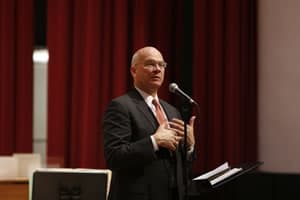Effective ministry in a Changing Culture: An Interview with Tim Keller


My latest column from Christian Week:
Tim Keller is pastor of Redeemer Presbyterian Church in New York, and author of the recently published book The Prodigal God. I recently interviewed Keller about effective ministry in a changing culture. Here’s the second part of the interview, continued from the October 15 issue of Christian Week. (You can read part one here.)
Some seem to have risen to the challenge of effective ministry in a changing culture. Who can we learn from?
I am actually a bit reluctant to lift anyone up high as a shining example—including Redeemer Presbyterian. Let me put it like this: John Stott at All Souls Church in London pioneered a new kind of church that united vigorous gospel evangelism, concern for the needs of the neighborhood and the city, discipling people to integrate their faith and their secular vocation, a high regard for the arts and a high regard for expository preaching. This is a very remarkable balance. Most churches tend to major in just one or at most two of these—either evangelism/church growth or social justice issues or arts and culture or sound doctrine and exposition, and so on.
All Souls and other traditional “city-centre” churches (like Tenth Presbyterian in Philadelphia) in the last generation found ways of balancing these ministries and keeping them inter-dependent and inter-related.
Today, I see a whole lot of younger ministers, especially in cities, starting churches that aren’t marked by the “venerable” cultural conservatism that often went with older downtown “cathedrals,” and yet are still solidly biblical and keep this same broad range and balance. This is a great trend. Richard Lovelace in his Dynamics of Spiritual Life said the mark of a revived church was this same breadth and balance.
It’s easy to get overwhelmed by the challenges that the North American Church is facing. What keeps you encouraged?
Prayer. Meeting God in prayer. Sorry to sound so trite. Prayer and meditation brings joy. God is on His throne—everything’s going to be fine in the end. The new heavens and new Earth are coming in which “everything sad is going to come untrue.” Don’t get too bent out of shape because your church didn’t grow this year.
How do we change in order to contextualize without changing the gospel?
That is the practical question in ministry. If you under-contextualize your ministry and message, no one’s life will be changed because they’ll be too confused about what you are saying. But if you over-contextualize your ministry and your message, no one’s life will be changed because you won’t really be confronting them and calling them to make deep change.
If this scares you and you say, “Well then let’s not even try it,” then you have to remember something: to over-contextualize to a new generation means you can make an idol out of their culture, but to under-contextualize to a new generation means you can make an idol out of the culture you come from. So there’s no avoiding it.
There’s far more to say about this subject, but I’ll just give you one bit of advice. The gospel is the key. If you don’t have a deep grasp on the gospel of grace, you will either over-contextualize because you want so desperately to be liked and popular, or you will under-contextualize because you are self-righteous and proud and so sure you are right about everything. The gospel makes you humble enough to listen and adapt to non-believers, but confident and happy enough that you don’t need their approval.
Please tell us about why you’ve written The Prodigal God, and if you have more books planned after that.
Probably the single sermon in which (I feel) I get the gospel across most clearly is the sermon I have preached several times over the years on the parable of the prodigal son in Luke 15. So I decided to turn it into a short book.
I chose the name The Prodigal God for the book. For years I’ve publicly prayed to God “thank you for your prodigal grace” and I’ve heard other people pray that way too. Most folks know that “prodigality” and “prodigious” mean abundant and generous. It can also mean recklessly and irresponsibly extravagant. Spurgeon once preached a sermon titled “Prodigal Love for the Prodigal Son.”
I have noticed in the past few years that the negative aspect of the word’s lexical range seems to be getting more dominant. That is, more and more people think of the term as meaning only “wayward.” So I was trying to do a little philological rescue and recovery project! And the title helps people realize the only way God can deal with our sin is through a kind of grace that appears irresponsibly extravagant to Pharisaical “elder brothers.”
Yes, I’m working on another book now on what the Bible says about “doing justice.”





